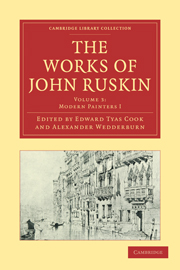Book contents
- Frontmatter
- Contents
- LIST OF ILLUSTRATIONS
- INTRODUCTION TO THIS VOLUME
- BIBLIOGRAPHICAL NOTE
- MODERN PAINTERS VOLUME I
- AUTHOR'S PREFACE TO FIRST EDITION (1843)
- AUTHOR'S PREFACE TO SECOND EDITION (1844)
- AUTHOR'S PREFACE TO THIRD EDITION (1846)
- AUTHOR'S PREFACE TO NEW EDITION (1873)
- AUTHOR'S SYNOPSIS OF CONTENTS
- PART I OF GENERAL PRINCIPLES
- SECTION I OF THE NATURE OF THE IDEAS CONVEYABLE BY ART
- CHAPTER 1 INTRODUCTORY
- CHAPTER II DEFINITION OF GREATNESS IN ART
- CHAPTER III OF IDEAS OF POWER
- CHAPTER IV OF IDEAS OF IMITATION
- CHAPTER V OF IDEAS OF TRUTH
- CHAPTER VI OF IDEAS OF BEAUTY
- CHAPTER VII OF IDEAS OF RELATION
- SECTION II OF POWER
- PART II OF TRUTH
- SECTION I GENERAL PRINCIPLES RESPECTING IDEAS OF TRUTH
- SECTION II OF GENERAL TRUTHS
- SECTION III OF TRUTH OF SKIES
- SECTION IV OF TRUTH OF EARTH
- SECTION V OF TRUTH OF WATER
- SECTION VI OF TRUTH OF VEGETATION.—CONCLUSION
- Appendix
- Plate section
CHAPTER II - DEFINITION OF GREATNESS IN ART
Published online by Cambridge University Press: 07 September 2011
- Frontmatter
- Contents
- LIST OF ILLUSTRATIONS
- INTRODUCTION TO THIS VOLUME
- BIBLIOGRAPHICAL NOTE
- MODERN PAINTERS VOLUME I
- AUTHOR'S PREFACE TO FIRST EDITION (1843)
- AUTHOR'S PREFACE TO SECOND EDITION (1844)
- AUTHOR'S PREFACE TO THIRD EDITION (1846)
- AUTHOR'S PREFACE TO NEW EDITION (1873)
- AUTHOR'S SYNOPSIS OF CONTENTS
- PART I OF GENERAL PRINCIPLES
- SECTION I OF THE NATURE OF THE IDEAS CONVEYABLE BY ART
- CHAPTER 1 INTRODUCTORY
- CHAPTER II DEFINITION OF GREATNESS IN ART
- CHAPTER III OF IDEAS OF POWER
- CHAPTER IV OF IDEAS OF IMITATION
- CHAPTER V OF IDEAS OF TRUTH
- CHAPTER VI OF IDEAS OF BEAUTY
- CHAPTER VII OF IDEAS OF RELATION
- SECTION II OF POWER
- PART II OF TRUTH
- SECTION I GENERAL PRINCIPLES RESPECTING IDEAS OF TRUTH
- SECTION II OF GENERAL TRUTHS
- SECTION III OF TRUTH OF SKIES
- SECTION IV OF TRUTH OF EARTH
- SECTION V OF TRUTH OF WATER
- SECTION VI OF TRUTH OF VEGETATION.—CONCLUSION
- Appendix
- Plate section
Summary
Distinction between the painter's intellectual power and technical knowledge.
In the 15th Lecture of Sir Joshua Reynolds, incidental notice is taken of the distinction between those excellences in the painter which belong to him as such, and those which belong to him in common with all men of intellect, the general and exalted powers of which art is the evidence and expression, not the subject. But the distinction is not there dwelt upon as it should be, for it is owing to the slight attention ordinarily paid to it, that criticism is open to every form of coxcombry, and liable to every phase of error. It is a distinction on which depend all sound judgment of the rank of the artist, and all just appreciation of the dignity of art.
Painting, as such, is nothing more than language
Painting, or art generally, as such, with all its technicalities difficulties, and particular ends, is nothing but vehicle of thought, but by itself nothing. He who has learned what is commonly considered the whole art of painting, that is, the art of representing any natural object faithfully, has as yet only learned the language by which his thoughts are to be expressed. He has done just as much towards being that which we ought to respect as a great painter, as a man who has learnt how to express himself grammatically and melodiously has towards being a great poet.
- Type
- Chapter
- Information
- The Works of John Ruskin , pp. 87 - 92Publisher: Cambridge University PressPrint publication year: 2010First published in: 1903



